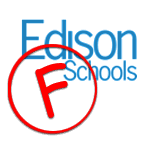 Perhaps Chris Whittle should go back to a business he was good at, like putting advertainment reading material above the urinals in Knoxville eateries. Now working on his third edu-business collapse, it is certainly clear that Train Wreck would have been a better title than Crash Course for his lightweight 2005 opus on the bright future of corporate welfare education.
Perhaps Chris Whittle should go back to a business he was good at, like putting advertainment reading material above the urinals in Knoxville eateries. Now working on his third edu-business collapse, it is certainly clear that Train Wreck would have been a better title than Crash Course for his lightweight 2005 opus on the bright future of corporate welfare education.Now he is once again faced with corporate calamity, this time from an impending cut to his 20 Philadelphia macschools, which represent 20% of his testing stores nationwide. Part of the story from the Philadelphi Inquirer:
Inquirer Staff Writer
In 2002, the Philadelphia School District embarked on the nation's largest experiment in private management of public schools, with educators across the country watching.
As the five-year anniversary approaches, the district's leadership is proposing to halve funding next fiscal year to the six private managers running 41 of the district's 270-plus schools. The managers include the for-profit Edison Schools Inc., which runs 20 of the schools.
Such a move could further erode the privatization movement in public school systems, which never took off as envisioned, experts say. Potential operators realized the hurdles in dealing with union contracts and limited resources and opted to try charter schools, tutoring, and other educational services instead.
"Had this been outstandingly successful, I think you would have seen a whole bunch of cities jump on the bandwagon," said Henry M. Levin, director of the National Center for the Study of Privatization in Education at Columbia University.
About 500 schools, including some charters, are run by outside managers nationwide - one half of 1 percent, he said.
In Philadelphia, schools chief Paul Vallas wants to cut 10 percent of the funding to the district's educational management organizations (EMOs) this year. If the School Reform Commission agrees, the funding would be cut again next year, for a total of 50 percent.
Vallas' proposal, which is to be decided on by April, grew out of the district's attempts to close a $73.3 million deficit in its $2.04 billion budget. But district officials had talked before that of axing managers or taking away some of their schools if performance waned.
Would such a large funding decrease next year mean the district's controversial venture had failed? Vallas says no. Others disagree.
The district learned some lessons, Vallas said. It adapted, for example, the six-week student testing system from Edison to track student progress.
"The goal wasn't to establish a permanent long-term relationship. It was to bring them in, let them improve those schools, then pull them out," Vallas said.
Some defend the managers, saying they were able to show gains even with the lowest-performing schools while fostering competition.
"The reality is that prior to these reforms, there had been no student achievement of any kind of comprehensive sort across Philadelphia," said Jeanne Allen, president of the Center for Education Reform, a proponent of charter schools and school choice.
If the outside managers disappeared, Allen said, "there's no reason not to go back to business as usual."
But others have pronounced the effort a failure and say it's time the district admits it, cuts its losses, and moves on. The managers, they say, failed to produce achievement on par with the extra money they get.
District-run schools overall have done better on state tests. The 2006 results show that overall, 11 of the 43 schools run by the managers met federal performance targets, down from 15 in 2005. The for-profit Edison and Victory Schools had fewer schools meeting federal targets. Only Foundations Inc. improved, by one school.
Edison, Victory, Foundations and Universal Companies receive $750 more per student than the district spends, while the University of Pennsylvania and Temple University get $450 more. Collectively, the managers are paid about $18 million to run the schools.
"It isn't so much that these EMOs are doing bad things, but it's very difficult to suggest that it's doing better than the district can do when the district puts its mind to it," said Columbia's Levin. "They're getting $22,000 more a classroom. Now the question is - hey, is it really worth it?" . . .
No comments:
Post a Comment